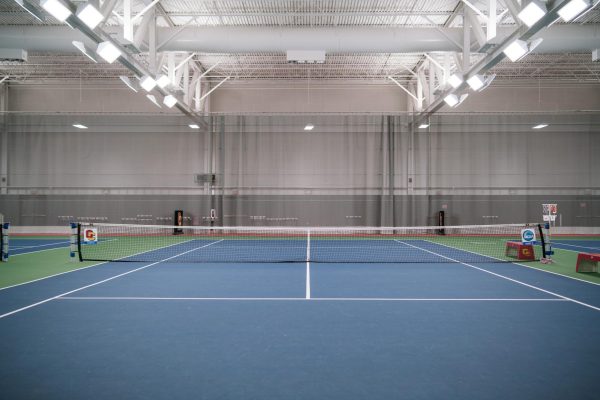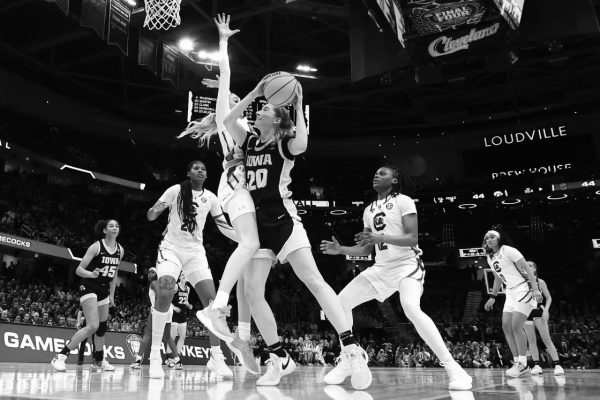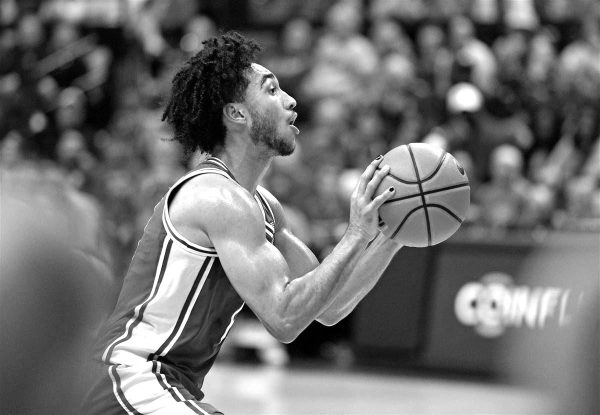Former Men’s Soccer Players Take Up Horseback Riding
As a child, College senior and former men’s soccer player Daniel Tuzzolino wanted to be a cowboy. In his last semester at Oberlin, he convinced his housemate and then-teammate Trenton Bulucea — also a College senior — to register with him for ATHL 147, a first-module horseback riding course worth half a credit. Bulucea had ridden horses at summer camps throughout his childhood, but for the most part, the class has been a completely new experience for both of them.
The class — which consists of 12 students — meets every Tuesday and Thursday from 4:45–6 p.m. at Equine Differences, located just north of the College on Leavitt Road. Instructing the class is the stable’s owner, Ric Weitzel. Weitzel has been competing and coaching for over 30 years and has supervised numerous world and national champion riders. He’s also the head coach of the Oberlin College Equestrian Team.
Tuzzolino and Bulucea’s interests didn’t include horseback riding before registering for the class. Tuzzolini, a Biology major, is looking to complete two years of research post-graduation. After that, he plans on attending graduate school for disease ecology or conservation biology. Bulucea, a Mathematics major and Sociology minor, plans to move to Columbus for a few years after graduation to get real-world experience in a corporate job.
Neither Tuzzolino or Bulucea knew much about horseback riding prior to this semester, but both are impressed by how much they have learned so far.
“I knew nothing coming in,” Bulucea said. “I didn’t even know there are two types of saddles. We’ve learned facts about horseback riding and its history, but we’ve also gotten experience setting up and taking care of the horses.”
The first thing students do when they get to the stable is take the blankets off the horses. According to Tuzzolino and Bulucea, the blankets are used as insulation during the winter to keep the horses’ hair short. In addition, the lights in the stable are specially tuned to simulate the summer sun to further prevent the hair from growing. The longer the horses’ hair gets, the more likely they are to overheat.
Next, the class leads the horses out to one of the barns, where they proceed to groom the horses, brush them, and pick dirt and poop out of their hooves. According to Tuzzolino and Bulucea, the entire process only takes up to 15 minutes. However, cleaning their hooves is the most difficult part, as the horses often won’t lift their legs up.
While Weitzel doesn’t administer quizzes throughout the module, the class is tested on their ability to properly saddle and groom the horses.
According to Tuzzolino, one of the most important and fascinating aspects of horseback riding basics is body language. The challenge in communicating with horses is striking a balance between calmness and toughness. Horses tend to be frightened easily, but because they’re herd animals, they need a leader — the rider — to follow. Like dogs, horses start training at a very young age and respond to positive reinforcement.
“If the horse wanted to, it could kick you through the wall,” Tuzzolino said. “When you want the horse to slow down or stop, you say ‘whoa.’ You say ‘easy’ when you want the horse to walk. And to get the horse to trot or jog, you make a clicking noise and give the horse a kick with your heels. To get the horse to canter, you make a kissing noise.”
Tuzzolino said he and Bulucea are holding their own in class, despite their lack of experience.
“I think we’re doing pretty well,” Tuzzolino said. “I feel like that’s because we genuinely like the horses and are very interested in what we’re doing. A lot of it has to do with how competitive we are. After class I’m always like, ‘I’m better than you.’ I’ll always let [Bulucea] know that I’m better than him.”
Despite his satisfaction with the class and increased interest in the sport, Tuzzolino isn’t sure if he’ll continue horseback riding once the module is over.
“Horses are expensive, going to riding lessons is expensive, finding a stable is hard, and finding an instructor is hard,” Tuzzolino said. “It’s not something where you can just be like, ‘Oh, sweet! I’ve got five bucks in my pocket. What am I doing to do today? Let’s go ride horses.’ In order to ride horses, you have to be dedicated to competing with them properly, or have enough financial stability. You can’t just pick it up.”
Even so, Tuzzolino and Bulucea said they are grateful to have stepped out of their comfort zone and learned something new. The class ends March 22, when the first module is finished, but will be offered again first module next fall.





